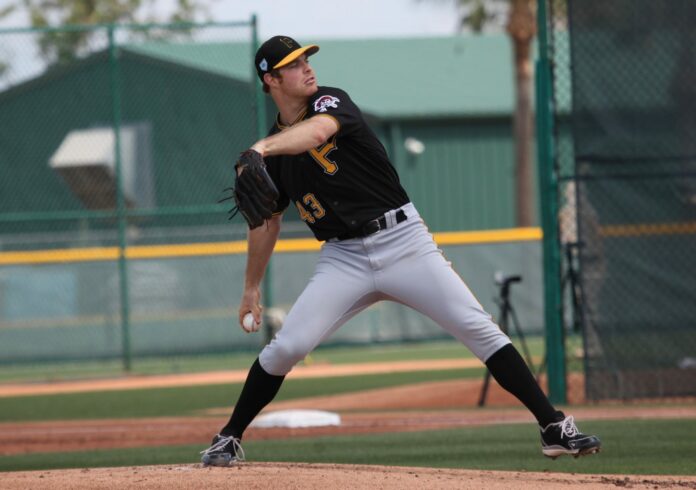Coming into 2019, James Marvel had the upside of a Major League middle reliever. The 2015 36th round pick slowly worked his way up the system after signing for a slightly over-slot deal. His first year with the team was spent recovering from Tommy John surgery, while the next year was somewhat limited to let him slowly build up his innings. Over the last three years he has split his time between two levels in the minors, but he took it a step further by playing at a third level in 2019, finishing the season in the majors.
Along this journey, Marvel has evolved into the pitcher we saw this year. He made 28 minor league starts this season, posting a 2.94 ERA in 162.1 innings, with a 1.09 WHIP, a .223 BAA and a 136 strikeouts. Marvel was first among all Pirates starters (minimum 100 IP) in ERA, second in innings, fourth in WHIP and first in strikeouts. Those stats led to James Marvel being named as the Pirates Prospects 2019 Pitcher of the Year.
There were other pitchers in the system who had strong seasons, but they only received mild consideration for the Pitcher of the Year. If we picked a runner-up, there would be a longer discussion to figure out who put together the second best season. For the top spot though, no one approached Marvel.
What really separated his performance this season from everyone else is what happened after his promotion to Indianapolis. With the International League using the same baseballs as the majors for the first time, the offense in the league really took off. Mitch Keller posted a 3.56 ERA and a 1.24 WHIP with Indianapolis and he was considered one of the best pitchers in the league this year. Marvel didn’t put in the innings that Keller did, but he pitched much better.
After getting promoted in early July, Marvel made 11 starts in Triple-A. He wound up with a 2.67 ERA in 60.2 innings, with a 1.12 WHIP and a .214 BAA. That was after posting a 3.10 ERA in 17 starts with Altoona. In his first month in Indianapolis, Marvel won our Pitcher of the Month award.
There wasn’t a lot of success on the pitching side with the jump from Altoona to Indianapolis this year due to the high offense in the league. A lot of pitchers struggled with the new baseballs, but Marvel was able to put up better stats at the higher level. While his promotion to the majors for four late season starts didn’t factor into his choice as the Pitcher of the Year (we actually picked the winner before his promotion), it does show you just how well he pitched in Triple-A. It took just 11 starts to earn him a shot at the majors and no one can say that he didn’t earn that chance.
Marvel becomes our ninth different Pitcher of the Year in ten years of us making a selection. As you can see from the list below, it doesn’t guarantee you anything, though it might be a good sign that he got his Tommy John surgery out of the way in college. Injuries sidetracked our first two winners, Rudy Owens and Kyle McPherson, though they both made the majors. Tyler Glasnow was the only two-time winner and he missed most of this year with injury, as did last year’s winner JT Brubaker. Then there’s Chad Kuhl, our 2015 pick, who spent all of 2019 recovering from Tommy John surgery.
You have some immediate success with 2012 winner Jeff Locke, who had an All-Star season the following year, then a decent 2014 season, before a few tough years to end his big league time. Steven Brault is basically in the same boat there, with a nice run this season, but overall mediocre at best results. Glasnow had success in limited time this year, while Mitch Keller (2016 winner) is still considered a top pitching prospect around baseball.
The one thing here with Marvel is that he is the only pitcher in that group who really came out of nowhere to win. All of the others were top 20 prospects going into their winning season, except Kyle McPherson, who the Pirates added to the 40-man roster that off-season. That something that didn’t happen with Marvel last winter, even though he was Rule 5 eligible. McPherson was also considered for our 2010 award because he put up big numbers and a strong strikeout rate in Low-A, so there wasn’t a lot of surprise with him winning the following year. Marvel beat those odds, doing it at a higher level with more offense, turning it into a September big league trial. Now he will go into 2020 trying to turn that trial into a regular spot.
Previous Winners
2010: Rudy Owens
2011: Kyle McPherson
2012: Jeff Locke
2013: Tyler Glasnow
2014: Tyler Glasnow
2015: Chad Kuhl
2016: Mitch Keller
2017: Steven Brault
2018: JT Brubaker



